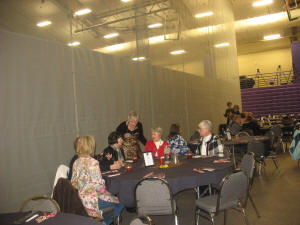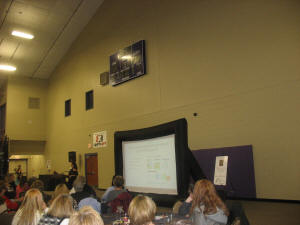|
 The event was sponsored
by ALMH Auxiliary and the ALMH Community Health Collaborative, also
keynote sponsor Dr. Kristen Green, session sponsors Jennifer Keith
and LuLaRoe, State Bank of Lincoln, and Vision Source/Nobbe Eye
Care, table sponsors ME Realty, and New Holland Banking Center.
Hostesses were the ALMH Auxiliary Board volunteers and staff. The event was sponsored
by ALMH Auxiliary and the ALMH Community Health Collaborative, also
keynote sponsor Dr. Kristen Green, session sponsors Jennifer Keith
and LuLaRoe, State Bank of Lincoln, and Vision Source/Nobbe Eye
Care, table sponsors ME Realty, and New Holland Banking Center.
Hostesses were the ALMH Auxiliary Board volunteers and staff.

ALMH Foundation
Executive Director Sarah Helm welcomed the ladies and thanked
sponsors, Lincoln College, the hostesses, the ALMH Community Health
Collaborative, and those who prepared the healthy food for the
social hour that began the evening.











Helm said they have
partnered to inspire and motivate all who attended to improve the
health of their families and empower people to further the message
of health.
Helm then introduced the two breakout sessions led by Jennifer
DiPasquale and Alicia Sparks. DiPasquale’s session was titled
“Sugar. Sugar” and she shared how sugar and carbohydrates affect the
body in both good and bad ways. Sparks’ session was titled
“Resiliency for Real Life” and she shared how to practice resilience
and mindfulness.


After the breakout
sessions, the ladies came back together to have dessert and hear
ALMH Community Health Collaborative Director Angela Stoltzenburg
speak on the topic “Wellness Ain’t Easy.” As she spoke, Stoltzenburg
would pause to ask the question, “Is it Easy?” and had attendees
reply, “It Ain’t Easy.”

Stoltzenburg said the
Center for Disease Control lists ways to improve health and
well-being for all. The CDC says the core areas that influence a
community’s health are socioeconomic factors, health behaviors,
physical environment, and clinical care.
Stoltzenburg said the Robert Woods Johnson Foundation does a yearly
county health ranking. Logan County is ranked 65 out of 102 Illinois
counties, having moved up from 66. In providing access to quality
healthcare, the county is ranked tenth. For personal health, 40
percent is based on socioeconomic factors, 30 percent is health
behaviors, and 10 percent is physical environment, so access to
healthcare just makes up 10 percent.

Stoltzenburg said the objective of the Community Health
Collaborative is to improve access to clinical care, to promote
healthy behaviors, to improve the physical environment, and to
address the social determinants of health. There are many ways the
collaborative is working to make the county healthier. She discussed
several programs in the county that encourage healthy choices.
Stoltzenburg said the ALMH Community Health Collaborative Advisory
Board has representatives from ALMH, the Lincoln Police Department,
Community Action Partnership of Central Illinois, the Lincoln Park
District, the YMCA, Memorial Behavioral Health, the Logan County
Department of Public Health, the Logan County Regional Planning
Commission, the Logan County Parks and Trails Foundation, private
businesses, and Dr. Stephanie Gadbois.
Stoltzenburg said the Community Health Collaborative Network
represents even more partners in the community and meetings are held
quarterly at ALMH to talk about what they are working on and share
resources with one another. Anyone can join.
To figure out what the
county needs to work on, a Community Needs Health Assessment was
done in 2015 and top needs listed were chronic disease management,
diabetes care, obesity, access to healthcare, and mental health.
[to top of second column] |

Stoltzenburg said some
other programs in the county connected to the Community Health
Collaborative are the Safe Ride Program, Victim Impact Panel, the
Opioid Task Force, Safe Passages, Parents Matter Campaign, and
community awareness events.
The Safe Ride Program helps to prevent drunk driving by giving
people a free ride home from any bar in Lincoln to a home within
city limits.
The Victim Impact Panel works with the Logan County Probation
Office. The Panel is for those convicted of DUIs and those who have
been personally affected by a drunk driver or have injured
themselves because of drinking and driving.
The Opioid Task Force has established the Safe Passages program,
which allows those with drug addictions to present themselves to the
police who will help them find treatment even if they have opioids
on them.
The Parents Matter Campaign works with alcohol and drug abuse
prevention and encourages parents to talk to their kids about
alcohol. What parents do and say to children can have more effect
than anything else.
Stoltzenburg said community awareness events last year included a
Lincoln Theater showing of the documentary “Chasing the Dragon,”
about the life of an opiate addict and a live interactive exhibit
“Hidden in Plain Sight” with substance hidden throughout a model of
a teenager’s room.

Stoltzenburg said the county is offering drug disposal at the
Lincoln Police Department and Logan County Department of Public
Health. People can take old or expired medication to these locations
and they will be destroyed.
Stoltzenburg said the collaborative is educating people about
Naloxone and how to use it to save the life of someone during an
opioid overdose. She said people need to know how to recognize the
signs of an overdose and how to administer Naloxone. Narcan kits
were distributed to those who attended a training at the Wellness
Expo, and the Surgeon General has said Naloxone should be in the
hands of every community member.
The ALMH Collaborative is working to build a culture of wellness in
the county through various programs.
A breastfeeding promotion is encouraging mothers to breastfeed
children as it can help prevent obesity later in life. Businesses
can put decals on their windows to show breastfeeding is welcome.

The Coordinated
Approach to Child Health, or CATCH program, is teaching kids to make
healthier eating choices, take away sweets, eat more go foods than
slow foods and more slow foods than whoa foods.
Mental health first aid trainings are being offered to assist people
in learning to recognize why people are acting a certain way and to
deal with mental health issues. These trainings are eight hours and
those who take the training are certified to provide mental health
first aid.
The Mosaic program at Lincoln Junior High School screens and
identifies at risk children. A counselor in the school teaches kids
more coping skills. One teacher said there have not been any
suspensions this year.

The Abraham Lincoln Legacy Trail is creating a bike path throughout
Lincoln. The city has applied for an Illinois Transportation grant
that would provide funding for more signage and road markings.
The ALMH Collaborative is hoping to set up a small 40 foot by 40
foot fitness court at the old hospital site on Eighth Street where
people could do a seven minute workout at various stations.
Stoltzenburg said many are using the wellness trail at ALMH.
The Wellness Expo in February brought in over 650 people.
Stoltzenburg said an Illinois Youth Survey done every two years with
eighth, tenth, and twelfth graders asks students about their eating
habits, activities they are involved in, and substance. These
surveys aid to show what schools and parents should be doing to
reach out to kids, and the surveys help to get grant funding.
Prior surveys have shown that as many as 32 percent of eighth
graders drink. Many have their first sip of alcohol by age 15, start
drinking once or twice a month at age 16, and start smoking at age
14.
One troubling statistic is that 26 percent of high school students
reported binge drinking in the past two weeks. Binge drinking is
four or more drinks at one time for females, five or more at one
time for males.
Another jarring stat for parents, 38 percent of high school seniors
said that they have ridden in a car with someone who is drunk or
high.
Just half of those surveyed feel parents would think it is wrong to
drink or smoke. Only 57 percent said their parents have talked to
them about alcohol and even fewer about tobacco or marijuana.

Stoltzenburg said these surveys show expectations need to be higher.
She wants people to volunteer, support efforts at CATCH schools,
talk to kids, and like and share the ALMH Community Health
Collaborative Facebook page.
Stoltzenburg said it is important to think and act as a healthy
community.
Stoltzenburg said there are some uptrends in obesity, cancer, low
birth weights, and pregnant moms smoking. These are trends that need
to be reversed.
Stoltzenburg listed many ways to be healthier beyond just eating
more go foods. These tips include walking, jogging, working out,
attending weight loss or diabetes support groups, being mindful,
getting rid of added sugars, eating more fruits and vegetables, and
supporting community initiatives, schools, and local businesses.

Stoltzenburg said you
need to love yourself enough to take care of yourself and advocate
for your own health. She said events coming up include a walk on the
wellness trail and Yoga at the courthouse. The ALMH Market returns
Saturday, May 12th and continues until the end of September.

As the evening ended,
all the ladies received a goody bag with t-shirts that said “Love
Yourself Enough,” a calendar of upcoming events, and brochures about
ALMH programs. Everyone received a card to write out three healthy
attainable goals. These will be sent out to attendees as a reminder
to love yourself enough to take care of yourself.
The Ladies’ Night Out offered inspiration and motivation as those
attending learned many helpful wellness tips and ways to make Logan
County a healthy community.
[Angela Reiners] |